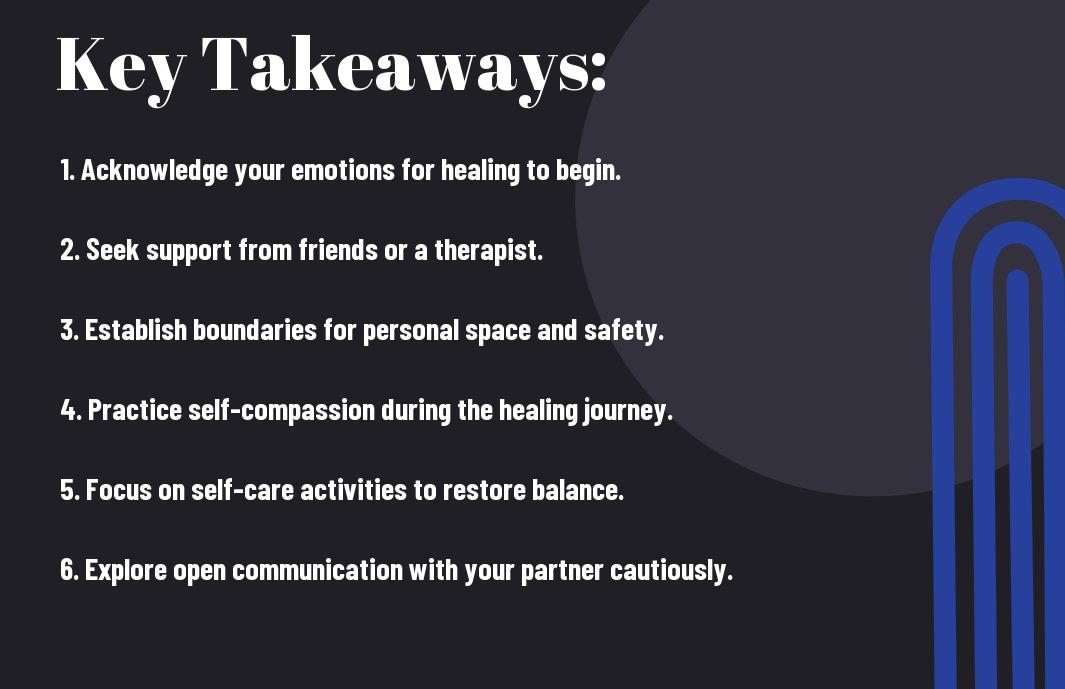Many individuals experience the devastating impact of infidelity, leaving you feeling betrayed, confused, and overwhelmed by emotional pain. Navigating through this tumultuous time can be challenging, but it is crucial to equip yourself with effective strategies to heal. In this post, you will discover five powerful tools that will empower you to cope, regain control, and pave the way for your emotional recovery. You don’t have to face this journey alone; finding the right support can significantly change your outlook as you move forward.
Key Takeaways:
- Understanding the emotional impact of infidelity is vital for healing.
- Communication with your partner is imperative for processing feelings and rebuilding trust.
- Establishing boundaries can help in navigating interactions and emotional responses.
- Seeking professional support, such as therapy, can provide valuable tools and guidance.
- Engaging in self-care activities is important for personal well-being during recovery.
- Allowing yourself to grieve the relationship and its changes can aid in the healing process.
- Focusing on personal growth and rediscovering individual interests can foster resilience.

Understanding Infidelity
As you navigate the tumultuous waters of infidelity, it’s crucial to grasp what it truly entails. Infidelity is often described as a breach of trust and commitment within a relationship, encompassing physical, emotional, or even psychological betrayals. Understanding the root causes, such as unmet needs or communication failures, can provide clarity as you work through the aftermath. This knowledge can serve as a vital stepping stone in your healing process and may even guide your future relationships.
The Emotional Impact
Before you start processing the emotional fallout, it’s important to acknowledge the overwhelming feelings you may experience. The betrayal can lead to a rollercoaster of emotions ranging from intense sadness to anger and confusion. These feelings are normal but can feel like a heavy weight on your shoulders. It’s crucial to find ways to express and manage these emotions to facilitate your healing journey.
Common Reactions to Betrayal
The common reactions to betrayal often include feelings of shock, disbelief, and overwhelming sadness. You might experience intense anger, or even guilt, questioning your self-worth and choices. It’s crucial to acknowledge that these feelings are valid and part of the healing process. Surrounding yourself with a supportive network can help you cope with the emotional upheaval you’re facing, even if it feels insurmountable.
Impact from infidelity can manifest in various ways as you struggle to come to terms with the betrayal. Physical symptoms such as headaches or fatigue may accompany emotional distress. You may also find yourself isolating from friends and family, amplifying feelings of loneliness. Importantly, recognizing that healing is not linear will help you navigate this complex emotional landscape. Seeking professional guidance can equip you with effective strategies for dealing with these common reactions, turning pain into personal growth.

Owning Your Feelings
Clearly, taking ownership of your feelings is the first step toward healing after infidelity. You need to acknowledge the emotional turmoil that comes with betrayal and seek effective strategies for dealing with infidelity. It is important to validate your emotions, whether they are anger, sadness, or confusion, as they are a natural response to such a painful experience.
Acknowledging Emotions
About understanding your emotional state, recognizing and naming what you feel is imperative for your healing journey. By acknowledging emotions like grief and disappointment, you give yourself permission to process them, allowing for personal growth.
Expressing Your Pain
Any form of emotional expression, whether through journaling, talking to friends, or seeking therapy, can be instrumental in processing your pain. Expressing yourself helps you articulate your feelings and prevents them from festering.
Plus, finding healthy outlets to express your pain can significantly ease your emotional burden. Whether it’s through writing or sharing with a trusted friend, allowing yourself to be vulnerable is a powerful step forward. Don’t bottle up your emotions; instead, channel them into creative endeavors or support groups. This kind of emotional release not only fosters understanding of your grief but also enables you to move towards forgiveness and healing in your own time.
Seeking Support
To navigate the turbulent waters of infidelity, seeking support from your loved ones can be invaluable. Surrounding yourself with a reliable support network allows you to share your feelings, gain perspective, and feel less isolated in your pain. Take the time to reach out to friends, family, or any trusted person who can offer empathy and understanding during this difficult period.
Importance of a Support System
The presence of a strong support system can provide the emotional strength you need when coping with betrayal. Having friends or family to lean on can alleviate feelings of loneliness, affirm that you are not alone in your struggle, and remind you of your worth. They can also help you process your emotions and offer different viewpoints to aid your healing journey.
Professional Help: Therapy Options
An effective way to cope with the emotional fallout from infidelity is to seek professional help through therapy. Couples therapy can help you and your partner navigate the complex feelings involved, while individual therapy allows you to address your personal pain and healing. Many therapists are trained in dealing with the nuances of infidelity and can provide specific strategies to help you work through your emotions.
Importance of therapy lies in its ability to connect you with a trained professional who can guide you through this tumultuous time. A therapist can offer a safe space for expressing your feelings and provide tools to understand the patterns of infidelity. These sessions can also focus on building your self-esteem, setting healthy boundaries, and improving communication skills in your relationships. Having someone to talk to can make a positive difference in your recovery from this painful experience.

Cultivating Self-Care
Many people overlook the importance of self-care during turbulent times like coping with infidelity. However, prioritizing your well-being is necessary for healing. Self-care allows you to nurture both your physical and emotional health, helping you regain strength and clarity. By focusing on yourself, you can create a more resilient foundation to navigate the pain while rediscovering your sense of self-worth.
Physical and Emotional Well-Being
Above all, taking care of your body and mind is vital. Engage in activities that promote physical fitness, such as exercise, proper nutrition, and adequate sleep. Emotionally, seek support from friends, family, or a therapist. Practicing mindfulness or meditation can help you manage stress and reduce anxiety, allowing you to process your emotions more effectively.
Activities for Healing
Across the journey of healing, engaging in activities that nourish your spirit can be transformative. Explore hobbies that spark joy or rekindle passion as a way to escape negative thoughts. Volunteer, join a support group, or practice art, as these activities promote emotional expression and connection. Taking time to indulge in activities you enjoy can lead to renewed energy and purpose in your life.
And while engaging in these healing activities, it’s important to actively identify what brings you joy and make time for these experiences. Seek out connections that uplift and inspire you, whether through social interactions or creative pursuits. Allow yourself to feel all emotions, as this is part of the healing process. Focus on establishing routines that prioritize your happiness and well-being to strengthen your recovery journey. Ultimately, these activities collectively contribute to a more fulfilling and positive path forward.
Rebuilding Trust
Despite the scars left by infidelity, rebuilding trust is entirely possible—it requires time, patience, and a committed effort from both partners. You must be willing to engage in honest conversations, actively listen, and confront the underlying issues that contributed to the betrayal. Trust can’t be restored overnight, but with consistent actions and transparent communication, you can create a foundation that supports healing and renewal in your relationship.
Steps to Re-establish Trust
After an affair, it’s important to outline clear steps to re-establish trust between you and your partner. First, acknowledge the pain caused and take full responsibility for your actions. Next, ensure that your partner feels heard by validating their feelings. Offering transparency about your daily life and being diligent about sharing your whereabouts can further contribute to rebuilding trust. Finally, make a commitment to change any harmful behaviors that led to the infidelity.
Communication Strategies
To effectively rebuild your relationship, open and honest communication is vital. You need to create a safe space where both you and your partner can express your feelings and concerns without fear of judgment. This means actively listening to each other and validating emotions, allowing you to process pain together and work towards understanding.
But effective communication goes beyond just talking; it’s about prioritizing emotional safety. This means practicing active listening without interrupting or becoming defensive. It’s important to share your thoughts and feelings using “I” statements to express how certain actions impact you. Schedule regular check-ins where both you and your partner can discuss progress and lingering issues. Being consistent in these conversations can lead to a deeper emotional intimacy while helping to create a more trustworthy environment.
Moving Forward
All relationships face challenges, but healing from infidelity is a unique journey that demands your focus and strength. To truly move forward, it’s imperative to process your emotions, redefine your life, and embrace the possibilities ahead. This phase is about reclaiming your happiness and finding new ways to feel fulfilled. You have the power to rebuild and create a future that aligns with your values and aspirations.
Setting Personal Goals
Behind every setback lies an opportunity for growth. As you navigate your healing journey, it’s important to set personal goals that empower you and provide direction. These goals can range from personal development to establishing healthier relationships. By focusing on what you want to achieve, you can create a roadmap to a brighter future that reflects your newfound strength and aspirations.
Learning from the Experience
Learning from the experience of infidelity can be transformative. You have the chance to reflect on how your needs and boundaries may have been overlooked, and this insight can guide you toward healthier future interactions. By acknowledging your feelings and examining patterns, you can build resilience. Understanding what went wrong can prevent similar situations in the future and empower you to foster healthy relationships. Indeed, using this experience as a learning tool allows you to emerge stronger, with a clearer sense of what you deserve in love and life.
Final Words
Hence, navigating the pain of infidelity can feel overwhelming, but equipping yourself with the right tools can help you regain your strength and clarity. By embracing self-care, seeking support, fostering open communication, setting boundaries, and focusing on personal growth, you can move towards healing and rebuild your sense of self. The journey may be challenging, but with these strategies in hand, you can emerge with renewed resilience and confidence in your future relationships.
FAQ
Q: What are some immediate steps to take after discovering infidelity?
A: Discovering infidelity can be overwhelming. It’s important to take a moment to breathe and process your emotions. One immediate step is to reach out to someone you trust, whether a friend or family member, to share your feelings. Journaling can also help clarify your thoughts and emotions. When ready, communicate with your partner about your feelings in a calm, collected manner, even if it’s difficult, to understand the situation better.
Q: How can I manage the emotional turmoil caused by infidelity?
A: Managing your emotions actively is vital. Consider practicing mindfulness or meditation to ground yourself in the present moment. Engaging in physical activities like jogging or yoga can also be beneficial in releasing pent-up emotions. Additionally, seeking professional help from a therapist or counselor specializing in infidelity can provide valuable perspective and coping mechanisms tailored to your unique experience.
Q: Is it possible to rebuild trust after infidelity?
A: Yes, rebuilding trust is possible, but it requires effort from both partners. Open and honest communication is vital; both individuals should express their feelings and fears. Setting clear boundaries and showing consistent behavior over time can pave the way for rebuilding trust. It’s also helpful to engage in couples therapy, which can facilitate understanding and healing as you navigate the path forward together.
Q: What role does self-care play in healing from infidelity?
A: Self-care is a significant aspect of the healing process. It allows you to recharge emotionally and physically. Engage in activities that bring you joy or relaxation, such as hobbies, exercise, or even simple pleasures like reading a good book. Ensuring that you eat well and get adequate sleep also contributes to your overall well-being, making it easier to cope with the pain of infidelity.
Q: How long does the healing process take after infidelity?
A: The healing process is highly individual and can take a varying amount of time depending on many factors, including the depth of feelings involved, personal resilience, and the actions taken by both partners post-disclosure. It’s vital to be patient with yourself and allow for fluctuations in your emotions. Seeking support and utilizing coping tools can facilitate a more constructive healing journey, but it’s important to understand that it might take weeks or even months to feel a sense of normalcy again.
